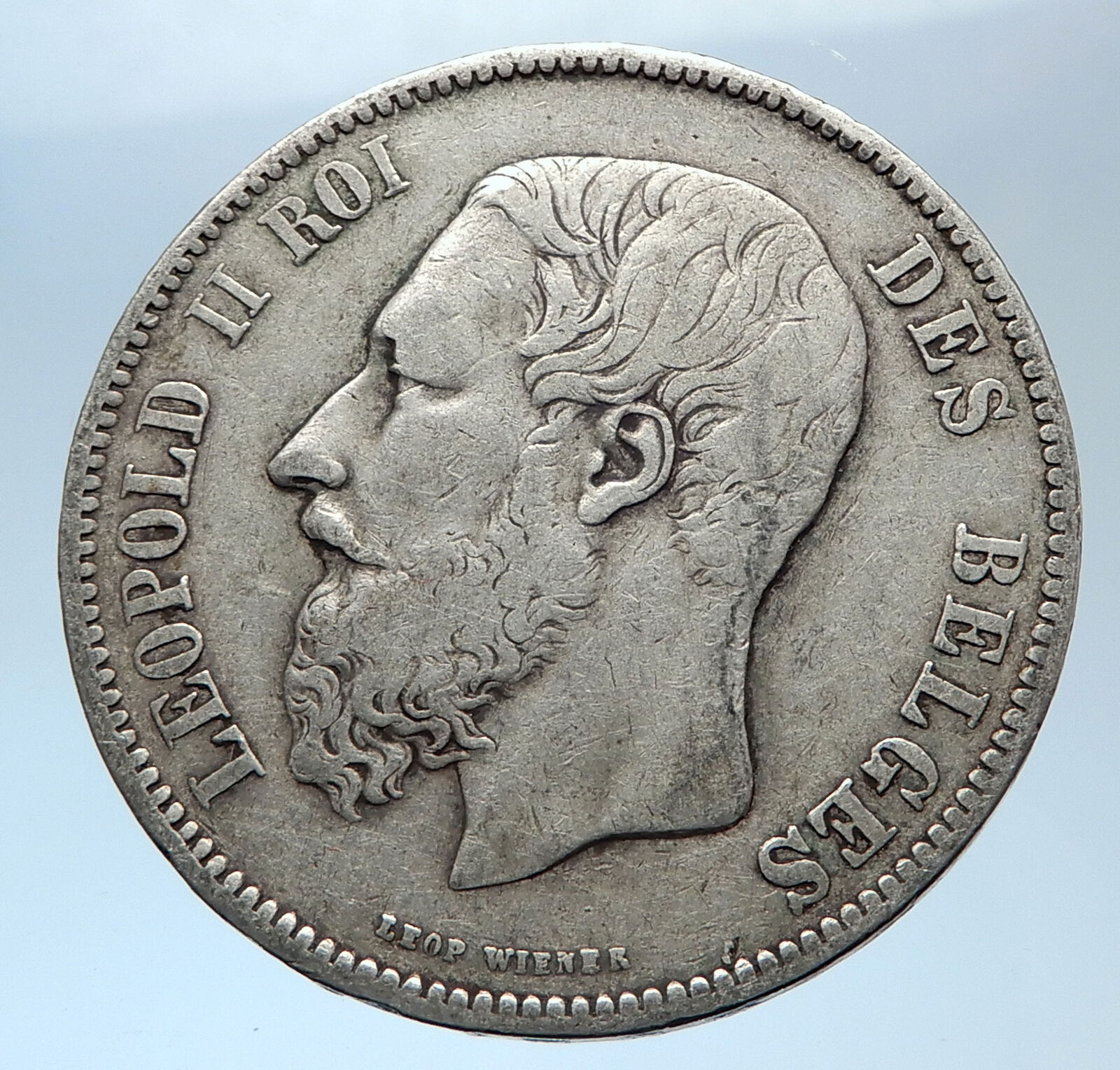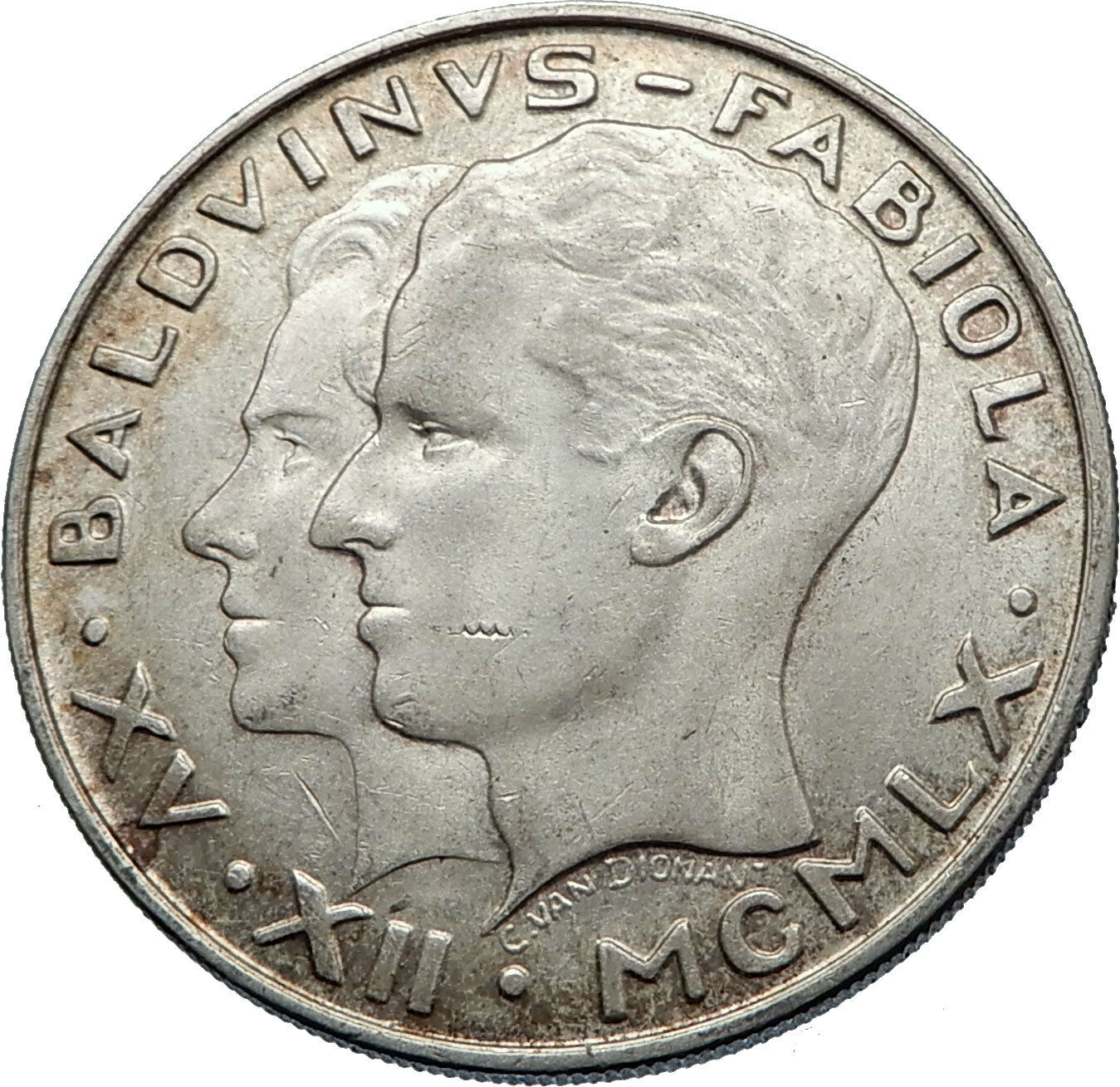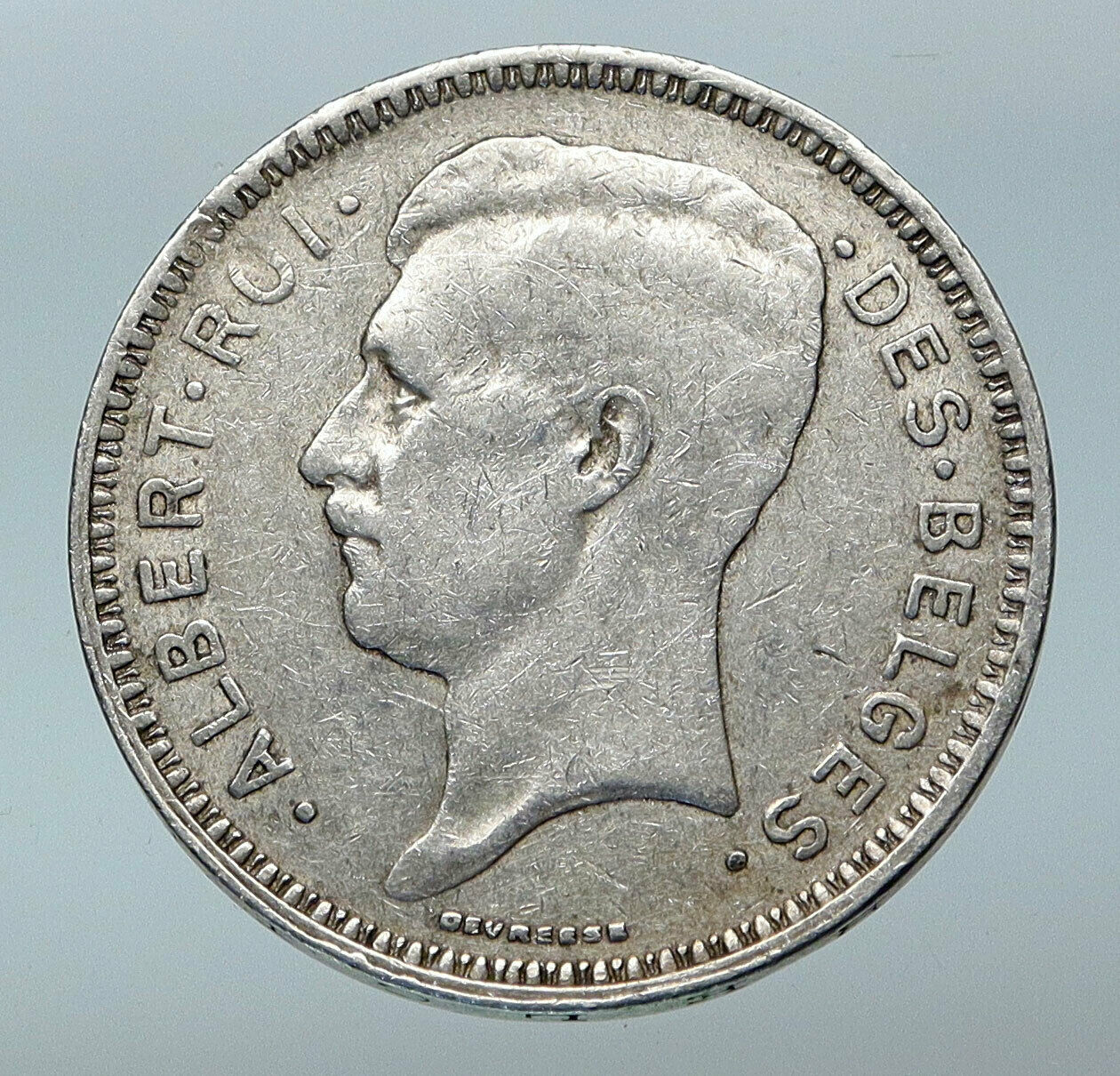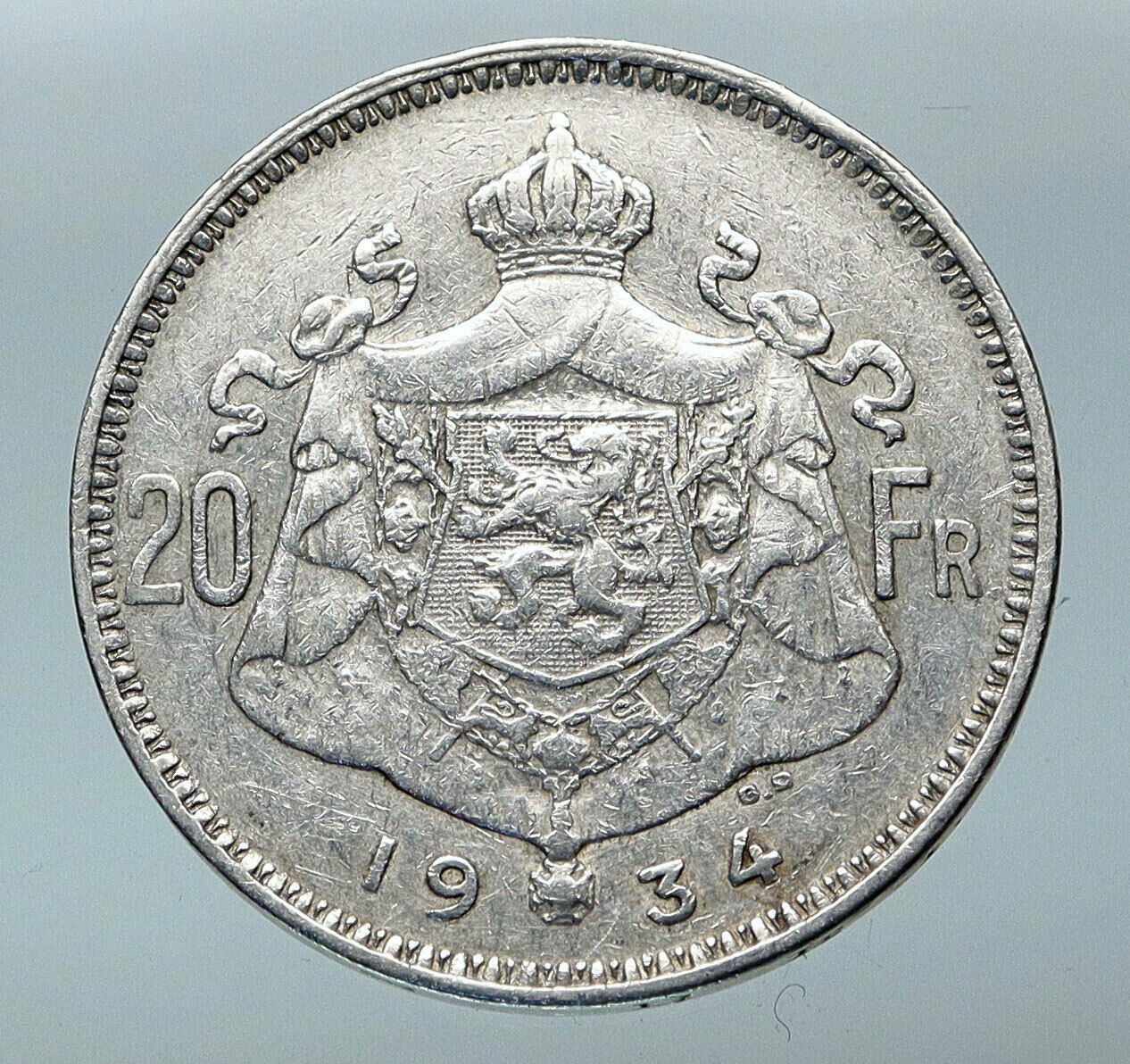|
Belgium
1954 Silver 50 Francs 28mm (12.53 grams) 0.835 Silver (0.3356 oz. ASW)
Reference: KM# 136, LA# BFM-185 (1948-54)
19 4 RAU, Head of Mercury facing right, caduceus dividing date.
BELGIQUE 50 F, Lion facing left with Belgian constitution.
You are bidding on the exact item pictured, provided with a Certificate of Authenticity and Lifetime Guarantee of Authenticity.
 Mercury is a major Roman god, being one of the Dii Consentes within the ancient Roman pantheon. He is the patron god of financial gain, commerce, eloquence (and thus poetry), messages/communication (including divination), travelers, boundaries, luck, trickery and thieves; he is also the guide of souls to the underworld. He was considered the son of Maia and Jupiter in Roman mythology. His name is possibly related to the Latin word merx (“merchandise”; compare merchant, commerce, etc.), mercari (to trade), and merces (wages); another possible connection is the Proto-Indo-European root merĝ- for “boundary, border” (cf. Old English “mearc”, Old Norse “mark” and Latin “margō”) and Greek οὖρος (by analogy of Arctūrus/Ἀρκτοῦρος), as the “keeper of boundaries,” referring to his role as bridge between the upper and lower worlds.[citation needed] In his earliest forms, he appears to have been related to the Etruscan deity Turms, both of which share characteristics with the Greek god Hermes. In Virgil’s Aeneid, Mercury reminds Aeneas of his mission to found the city of Rome. In Ovid’s Fasti, Mercury is assigned to escort the nymph Larunda to the underworld. Mercury, however, fell in love with Larunda and made love to her on the way. Larunda thereby became mother to two children, referred to as the Lares, invisible household gods. Mercury is a major Roman god, being one of the Dii Consentes within the ancient Roman pantheon. He is the patron god of financial gain, commerce, eloquence (and thus poetry), messages/communication (including divination), travelers, boundaries, luck, trickery and thieves; he is also the guide of souls to the underworld. He was considered the son of Maia and Jupiter in Roman mythology. His name is possibly related to the Latin word merx (“merchandise”; compare merchant, commerce, etc.), mercari (to trade), and merces (wages); another possible connection is the Proto-Indo-European root merĝ- for “boundary, border” (cf. Old English “mearc”, Old Norse “mark” and Latin “margō”) and Greek οὖρος (by analogy of Arctūrus/Ἀρκτοῦρος), as the “keeper of boundaries,” referring to his role as bridge between the upper and lower worlds.[citation needed] In his earliest forms, he appears to have been related to the Etruscan deity Turms, both of which share characteristics with the Greek god Hermes. In Virgil’s Aeneid, Mercury reminds Aeneas of his mission to found the city of Rome. In Ovid’s Fasti, Mercury is assigned to escort the nymph Larunda to the underworld. Mercury, however, fell in love with Larunda and made love to her on the way. Larunda thereby became mother to two children, referred to as the Lares, invisible household gods.
Mercury has influenced the name of many things in a variety of scientific fields, such as the planet Mercury, and the element mercury. The word mercurial is commonly used to refer to something or someone erratic, volatile or unstable, derived from Mercury’s swift flights from place to place. He is often depicted holding the caduceus in his left hand.
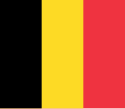 Belgium, officially the Kingdom of Belgium, is a sovereign state in Western Europe. It is a small, densely populated country which covers an area of 30,528 square kilometres (11,787 sq mi) and has a population of about 11 million people. Belgium, officially the Kingdom of Belgium, is a sovereign state in Western Europe. It is a small, densely populated country which covers an area of 30,528 square kilometres (11,787 sq mi) and has a population of about 11 million people.
 Straddling the cultural boundary between Germanic and Latin Europe, Belgium is home to two main linguistic groups: the Dutch-speaking, mostly Flemish community, which constitutes about 59% of the population, and the French-speaking, mostly Walloon population, which comprises 41% of all Belgians. Additionally, there is a small group of German-speakers who live in the East Cantons located around the High Fens area, and bordering Germany. Straddling the cultural boundary between Germanic and Latin Europe, Belgium is home to two main linguistic groups: the Dutch-speaking, mostly Flemish community, which constitutes about 59% of the population, and the French-speaking, mostly Walloon population, which comprises 41% of all Belgians. Additionally, there is a small group of German-speakers who live in the East Cantons located around the High Fens area, and bordering Germany.
Belgium is a federal constitutional monarchy with a parliamentary system of governance. It is divided into three regions and three communities, that exist next to each other. Its two largest regions are the Dutch-speaking region of Flanders in the north and the French-speaking southern region of Wallonia. The Brussels-Capital Region, officially bilingual, is a mostly French-speaking enclave within the Flemish Region. A German-speaking Community exists in eastern Wallonia. Belgium’s linguistic diversity and related political conflicts are reflected in its political history and complex system of government.
 Historically, Belgium, the Netherlands and Luxembourg were known as the Low Countries; it once covered a somewhat larger area than the current Benelux group of states. The region was called Belgica in Latin, after the Roman province of Gallia Belgica. From the end of the Middle Ages until the 17th century, the area of Belgium was a prosperous and cosmopolitan centre of commerce and culture. From the 16th century until the Belgian Revolution in 1830, when Belgium seceded from the Netherlands, the area of Belgium served as the battleground between many European powers, causing it to be dubbed the “Battlefield of Europe,” a reputation strengthened by both world wars. Historically, Belgium, the Netherlands and Luxembourg were known as the Low Countries; it once covered a somewhat larger area than the current Benelux group of states. The region was called Belgica in Latin, after the Roman province of Gallia Belgica. From the end of the Middle Ages until the 17th century, the area of Belgium was a prosperous and cosmopolitan centre of commerce and culture. From the 16th century until the Belgian Revolution in 1830, when Belgium seceded from the Netherlands, the area of Belgium served as the battleground between many European powers, causing it to be dubbed the “Battlefield of Europe,” a reputation strengthened by both world wars.
Upon its independence, Belgium participated in the Industrial Revolution and, during the course of the 20th century, possessed a number of colonies in Africa. The second half of the 20th century was marked by rising tensions between the Dutch-speaking and the French-speaking citizens fueled by differences in language and the unequal economic development of Flanders and Wallonia. This continuing antagonism has led to several far-reaching reforms, resulting in a transition from a unitary to a federal arrangement during the period from 1970 to 1993. Despite the reforms, tensions between the groups remain; the formation of a coalition government took 18 months following the June 2010 federal election.
Belgium is a founding member of the European Union, Eurozone, NATO, OECD and WTO, and a part of the trilateral Benelux Union. Its capital, Brussels, hosts several of the EU’s official seats as well as the headquarters of many major international organizations such as NATO. Belgium is also a part of the Schengen Area.
Belgium is a developed country, with an advanced high-income economy and is categorized as “very high” in the Human Development Index.
|








 Mercury is a major Roman god, being one of the Dii Consentes within the ancient Roman pantheon. He is the patron god of financial gain, commerce, eloquence (and thus poetry), messages/communication (including divination), travelers, boundaries, luck, trickery and thieves; he is also the guide of souls to the underworld. He was considered the son of Maia and Jupiter in Roman mythology. His name is possibly related to the Latin word merx (“merchandise”; compare merchant, commerce, etc.), mercari (to trade), and merces (wages); another possible connection is the Proto-Indo-European root merĝ- for “boundary, border” (cf. Old English “mearc”, Old Norse “mark” and Latin “margō”) and Greek οὖρος (by analogy of Arctūrus/Ἀρκτοῦρος), as the “keeper of boundaries,” referring to his role as bridge between the upper and lower worlds.[citation needed] In his earliest forms, he appears to have been related to the Etruscan deity Turms, both of which share characteristics with the Greek god Hermes. In Virgil’s Aeneid, Mercury reminds Aeneas of his mission to found the city of Rome. In Ovid’s Fasti, Mercury is assigned to escort the nymph Larunda to the underworld. Mercury, however, fell in love with Larunda and made love to her on the way. Larunda thereby became mother to two children, referred to as the Lares, invisible household gods.
Mercury is a major Roman god, being one of the Dii Consentes within the ancient Roman pantheon. He is the patron god of financial gain, commerce, eloquence (and thus poetry), messages/communication (including divination), travelers, boundaries, luck, trickery and thieves; he is also the guide of souls to the underworld. He was considered the son of Maia and Jupiter in Roman mythology. His name is possibly related to the Latin word merx (“merchandise”; compare merchant, commerce, etc.), mercari (to trade), and merces (wages); another possible connection is the Proto-Indo-European root merĝ- for “boundary, border” (cf. Old English “mearc”, Old Norse “mark” and Latin “margō”) and Greek οὖρος (by analogy of Arctūrus/Ἀρκτοῦρος), as the “keeper of boundaries,” referring to his role as bridge between the upper and lower worlds.[citation needed] In his earliest forms, he appears to have been related to the Etruscan deity Turms, both of which share characteristics with the Greek god Hermes. In Virgil’s Aeneid, Mercury reminds Aeneas of his mission to found the city of Rome. In Ovid’s Fasti, Mercury is assigned to escort the nymph Larunda to the underworld. Mercury, however, fell in love with Larunda and made love to her on the way. Larunda thereby became mother to two children, referred to as the Lares, invisible household gods. Belgium, officially the Kingdom of Belgium, is a sovereign state in Western Europe. It is a small, densely populated country which covers an area of 30,528 square kilometres (11,787 sq mi) and has a population of about 11 million people.
Belgium, officially the Kingdom of Belgium, is a sovereign state in Western Europe. It is a small, densely populated country which covers an area of 30,528 square kilometres (11,787 sq mi) and has a population of about 11 million people. Straddling the cultural boundary between Germanic and Latin Europe, Belgium is home to two main linguistic groups: the Dutch-speaking, mostly Flemish community, which constitutes about 59% of the population, and the French-speaking, mostly Walloon population, which comprises 41% of all Belgians. Additionally, there is a small group of German-speakers who live in the East Cantons located around the High Fens area, and bordering Germany.
Straddling the cultural boundary between Germanic and Latin Europe, Belgium is home to two main linguistic groups: the Dutch-speaking, mostly Flemish community, which constitutes about 59% of the population, and the French-speaking, mostly Walloon population, which comprises 41% of all Belgians. Additionally, there is a small group of German-speakers who live in the East Cantons located around the High Fens area, and bordering Germany. Historically, Belgium, the Netherlands and Luxembourg were known as the Low Countries; it once covered a somewhat larger area than the current Benelux group of states. The region was called Belgica in Latin, after the Roman province of Gallia Belgica. From the end of the Middle Ages until the 17th century, the area of Belgium was a prosperous and cosmopolitan centre of commerce and culture. From the 16th century until the Belgian Revolution in 1830, when Belgium seceded from the Netherlands, the area of Belgium served as the battleground between many European powers, causing it to be dubbed the “Battlefield of Europe,” a reputation strengthened by both world wars.
Historically, Belgium, the Netherlands and Luxembourg were known as the Low Countries; it once covered a somewhat larger area than the current Benelux group of states. The region was called Belgica in Latin, after the Roman province of Gallia Belgica. From the end of the Middle Ages until the 17th century, the area of Belgium was a prosperous and cosmopolitan centre of commerce and culture. From the 16th century until the Belgian Revolution in 1830, when Belgium seceded from the Netherlands, the area of Belgium served as the battleground between many European powers, causing it to be dubbed the “Battlefield of Europe,” a reputation strengthened by both world wars.

